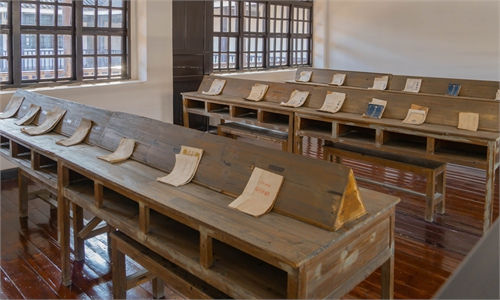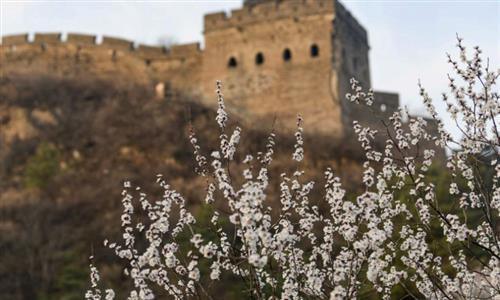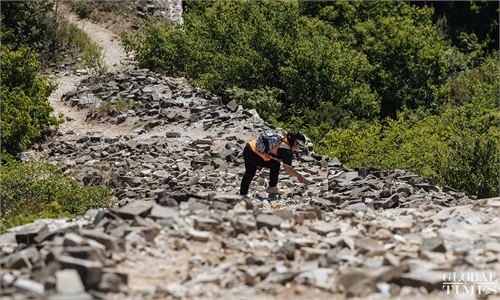IN-DEPTH / IN-DEPTH
Xi’s letter to Great Wall protectors inspires a broader effort to protect this Chinese cultural treasure for future generations
Heritage Guardians
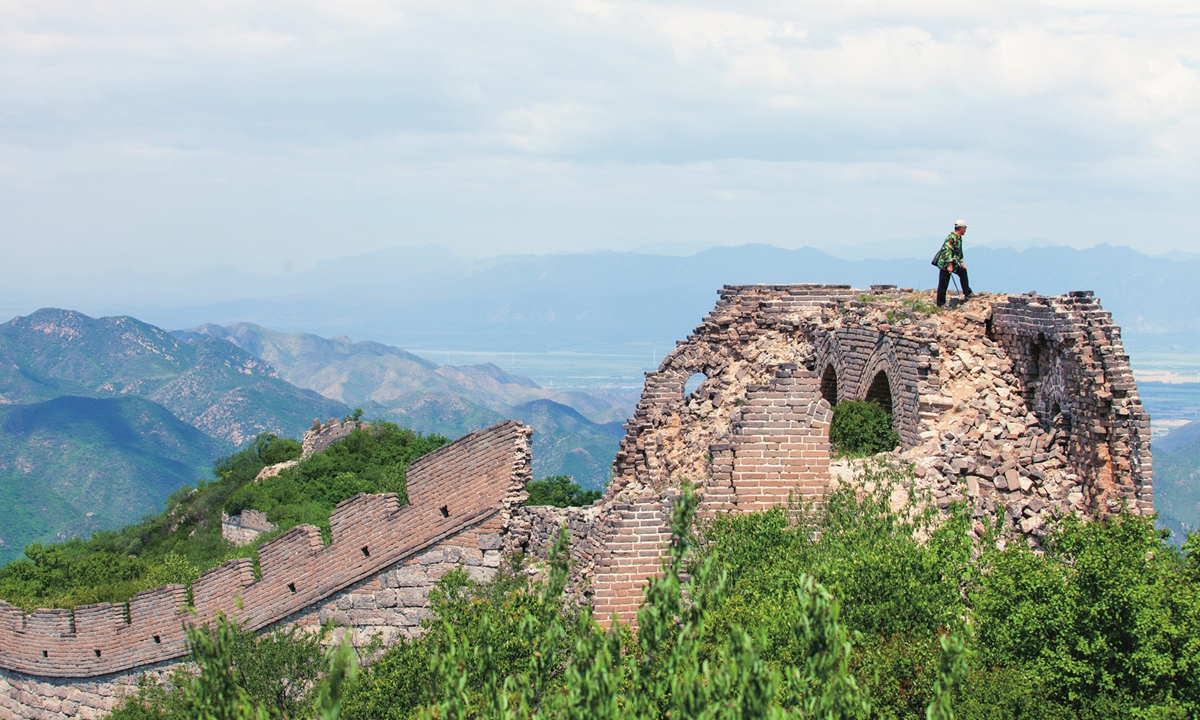
Mei Jingtian, a veteran Great Wall patroller, stands on the Great Wall gazing into the distance in June 2012 near Shixia village, Yanqing district, Beijing. Photo: Li Hao/GT
Editor's Note:Chinese people believe that letters are as valuable as gold. For thousands of years, letters, across mountains and oceans, have been delivering the writers' sentiments and conveying friendship and expectations.
Xi Jinping, general secretary of the Communist Party of China (CPC) Central Committee and Chinese president, has managed to find time to reply to some letters from different sectors of the society and different parts of the world despite his busy work schedule.
Through his letters, Xi has corresponded with people from all walks of life on numerous occasions, part of a series of excellent stories of China in the new era.
Therefore, the Global Times traced and contacted some of the recipients of Xi's letters to hear the inspiring stories behind the letters and their communications with the Chinese president.
In this installment, the Global Times visits a village at the foot of the Great Wall in Beijing's Yanqing district. People there take pride in protecting this world cultural heritage site. On May 15, they received a letter from President Xi. In his letter, Xi called for efforts to let more people know about the Great Wall and to engage more people in protecting the Great Wall so as to pass on the ancestors' precious heritage to future generations.
It takes 30 minutes, starting from Shixia village, to climb up to the ancient Great Wall on the ridge behind the village.
However, this mountain path is narrow and steep, characterized by loose stones, sandy soil, and prickly shrubs. For ordinary people, this route presents a challenging journey.
But for Great Wall patroller Mei Lanfen, such challenges are routine.
Mei Lanfen became a Great Wall patroller following the footsteps of her father Mei Jingtian.
Over 40 years ago, Mei Jingtian, now 80 years old, started his routine work of protecting the Great Wall - he would carry food and a wooden stick daily to patrol, picking up trash and collecting scattered bricks and steles along the wall.
In 2006, under his leadership, Shixia village in Yanqing district established a Great Wall volunteer protection association to jointly protect the Great Wall.
In April 2024, residents of Shixia village wrote to Xi, reporting their work in protecting the Great Wall and the changes the village has undergone.
To their surprise and great enjoyment, they soon received a reply.
In the reply letter, Xi said he was pleased to learn that the villagers in Shixia had taken the initiative over the years to protect the Great Wall, inherit the Great Wall culture, and rely on its resources on their way to prosperity, the Xinhua News Agency reported.
The Great Wall is a representative symbol of the Chinese nation and an important symbol of the Chinese civilization, Xi said. "It is our common responsibility to protect and pass on this historical and cultural heritage."
Guarding the Great Wall
Shixia village, established during the Ming Dynasty (1368-1644), historically served as a strategic pass in the northern part of Juyongguan (Juyong Pass), a notable checkpoint on the Great Wall, serving as a significant barrier defending Beijing.
Located in the southwestern part of Badaling town, adjacent to the famous Badaling section of the Great Wall, and at the foot of the Badaling section of the Great Wall, it is a typical village on the Great Wall.
Li Handong, Party chief of Shixia village, explained to the Global Times that about 20 years ago, when the importance of Great Wall protection was not widely recognized, the villagers of Shixia had already organized themselves to voluntarily protect the Great Wall.
Li told the Global Times that Shixia village was once an economically backward and sparsely populated small village. Many years ago, young villagers would go to the city to find work.
In recent years, by protecting the Great Wall, exploring Great Wall culture, and leveraging Great Wall resources, Shixia villagers have embarked on a "road to prosperity." With villagers having returned to their ancestral home, the village has become lively again.
Now, Shixia village has six full-time Great Wall patrollers, but all the villagers have participated in protecting the Great Wall. For example, on weekends, the village committee would organize some villagers to go up the mountain to pick up trash.
All this began with the pioneering action of Mei Jingtian, who started voluntarily patrolling the Great Wall 43 years ago.
"In the past, there were few volunteers, and we were short of hand. Now, with more people participating, we can say our whole village is full of enthusiastic volunteers," he told the Global Times. "Everyone has the responsibility."
He also showed reporters a photo taken in the autumn of 2018. Early in one morning, when he was picking up trash on the Great Wall, Mei Jingtian found some campers' tents and stoves.
"I didn't know what these kids were doing. I could not hear them well because I am hard of hearing, but I told them to pack up and leave quickly," he said, still a bit agitated. Some tourists' unintentional actions bring safety hazards to the Great Wall.
"I grew up at the foot of the Great Wall. Seeing someone damage it feels like my own house is being destroyed," Mei Jingtian said, getting excited when talking about his feelings for the Great Wall. "Now it is much better; the country recognizes us as official protectors, and we have more authority when explaining things to tourists."
When he received President Xi's reply, Mei Jingtian said he felt very overjoyed and even failed to fall asleep. He said that his villager peers have always been thinking about the protection and restoration of the Great Wall and they hope to develop tourism. The president's reply made them feel like their dreams had come true.
Joining the team
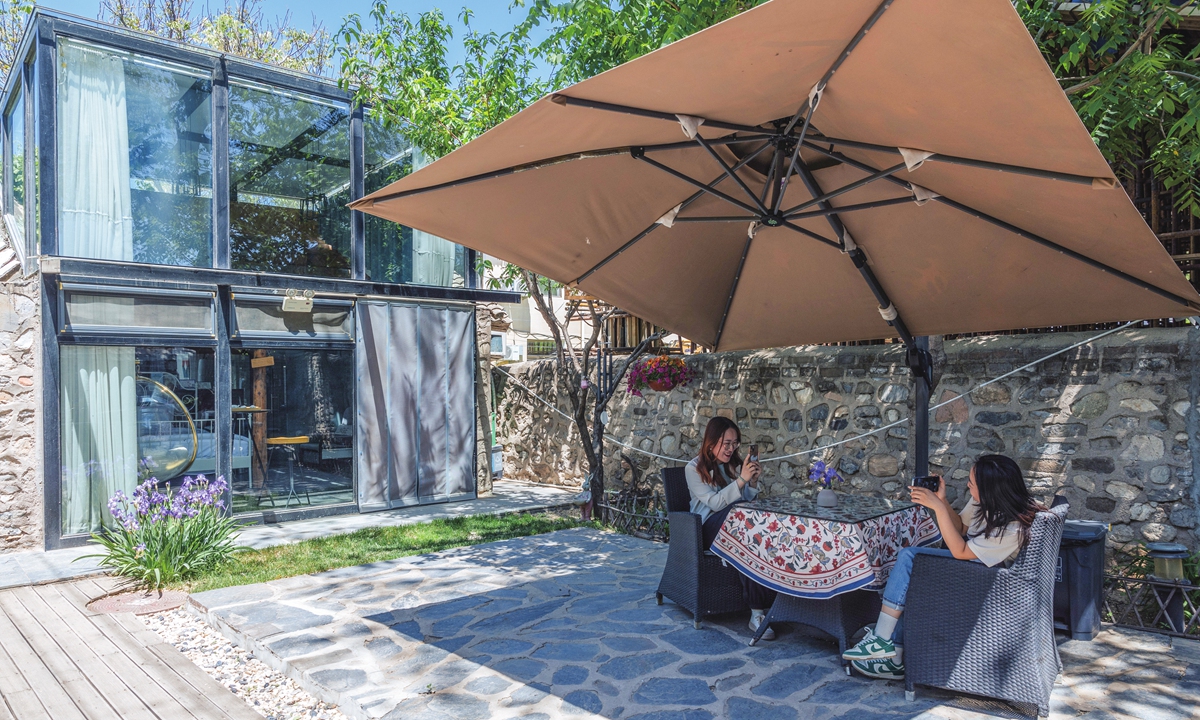
Two tourists chill in the garden of a homestay in Shixia Village, Yanqing District, Beijing, on May 17, 2024. Photo: Li Hao/GT
In his letter, Xi voiced his hope that the villagers would continue to protect the Great Wall as they protect their homes, carry forward Great Wall culture, and tell stories about the Great Wall well.The villagers are encouraged to contribute to building a strong socialist culture in China and promote Chinese modernization.
Although Mei Jingtian is no longer able to patrol the Great Wall frequently, he has gotten capable successors.
In 2019, six districts, including Yanqing, along the Great Wall in Beijing launched a recruitment drive for Great Wall patrollers. Mei Jingtian's daughter Mei Lanfen and niece Liu Hongyan were among the first ones to sign up.
After passing a series of examinations, evaluations, and physical fitness tests, they became two of the first six Great Wall patrollers in Shixia village.
They shoulder great responsibilities.
"This section of the Great Wall here is not open to the public, but some tourists still climb the mountain to visit. We have to not only pick up litter but also advise tourists not to carve graffiti on the walls and not to stay on the mountain too long to prevent accidents. Additionally, we take photos and upload images of any damage to the walls or towers for professionals to assess and repair," Liu explained.
The greatest challenge for Great Wall protectors come in the summer. In the summer, the mountains are densely covered with grass and trees, and snakes often appear. "There are also vicious red ants that are very dangerous. So, when we go up the mountain, we usually carry a stick to beat the grass and scare away snakes," Liu said, but with a confident smile.
In addition to threats from insects and snakes, bad weather is also a major risk. Mei Lanfen said that, on the Great Wall, they might encounter extreme weather. "Sometimes the wind is so strong that we can't stand steady, and we have to hold onto the wall and move slowly," she said.
Enduring the sun and wind, the patrollers have been working on the Great Wall for five years. "Climbing the Great Wall every day has become a habit. If we don't go one day, it feels like something is missing," Liu said.
Now, the patrollers also often bring their children to the Great Wall, picking up litter with them and telling them stories about their grandfather and uncle protecting the Great Wall. "The miracle of the Great Wall left by our ancestors must be continuously protected so that it can be passed down through generations," Mei Lanfen said.
Changes taking place
When the Global Times met Mei Jingtian, he was resting in the village's café.
This newly established café is one of the supporting facilities for Shixia village's tourism development, offering high-quality American coffee, lattes, caramel macchiatos, and some light meals. Its stylish decor has made it a popular spot for tourists.
Today, the Great Wall Shiguang Homestay in Shixia village has become a popular choice as a relaxing getaway in the northern suburbs of Beijing.
Walking into Shixia village, tourists can see rows of courtyards are connected. Adjacent to the homestay courtyards are the café, a library, a distillery, an oil mill, and a restaurant, all arranged in a scattered manner.
The village has 18 courtyards, each offering a view of the distant Shixia Pass at the Great Wall. On summer nights, tourists especially enjoy sitting in the courtyards, cooling off, counting stars, and enjoying a leisure time.
As early as in 2014, He Yuling, founder of the Beijing Shiguang Great Wall Homestay, rented the houses of 20 villagers and established the homestay, also bringing in specialty dining.
"After several years of development, we have not only run homestays but also gradually built public spaces like a village history museum, a library, and the café," said He. "This allows urban tourists to not only experience the leisure life of rural villages but also enjoy a rich and diverse rural vacation experience."
The Great Wall is the largest-scale existing cultural heritage in China. Since 2012, Xi Jinping has paid great attention to the work relating to tapping the cultural values and inheriting and protecting cultural relics of the Great Wall, making multiple instructions on advancing the building of the Great Wall National Cultural Park, according to Xinhua.
Hou Lin, deputy director of the Yanqing District Bureau of Culture and Tourism in Beijing, told the Global Times that there are currently more than 370 excellent homestays in Yanqing district, having created over 700 local jobs and boosting people's income by more than 23 million yuan ($3.3 million) in 2023.
In the future, Yanqing will continue to develop the "Great Wall + Homestay" cultural tourism integration model, exploring and telling the story of the Great Wall, and helping more villagers achieve prosperity, Hou noted.


